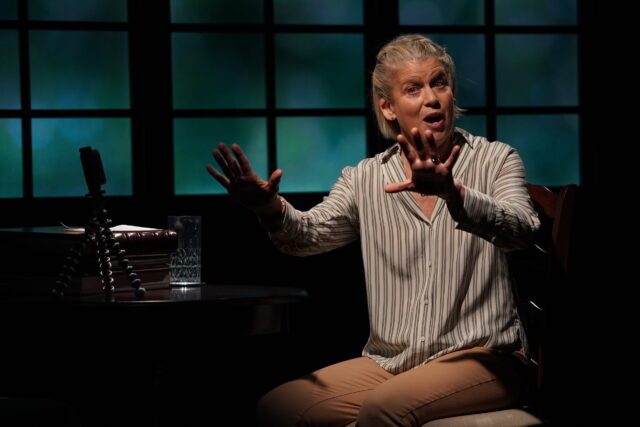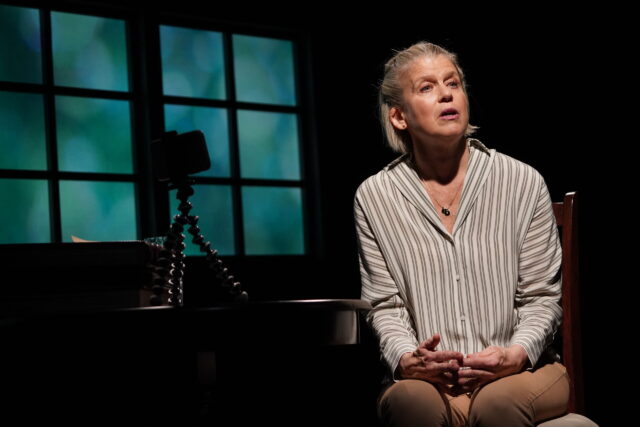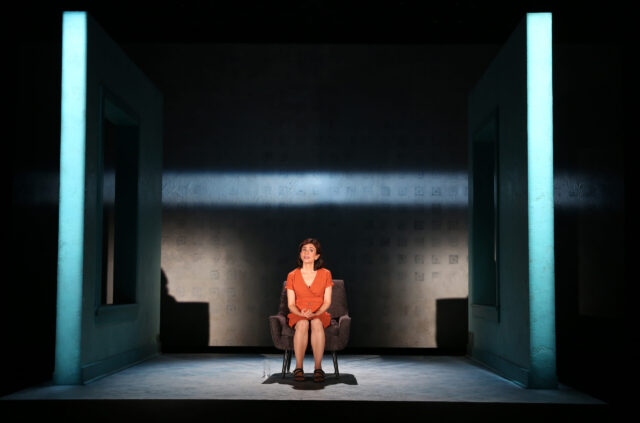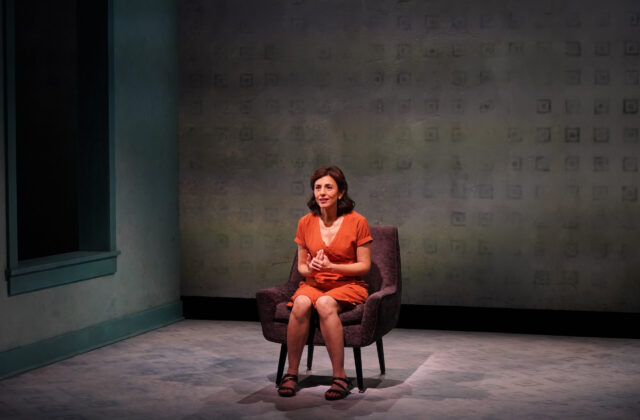
Mary (Tracy Thorne) explains why she chose to just sit there in Jack Was Kind (photo by Carol Rosegg)
JACK WAS KIND
Irish Repertory Theatre, W. Scott McLucas Studio Theatre
132 West 22nd St. between Sixth & Seventh Aves.
Wednesday – Sunday through December 18, $50
212-727-2737
irishrep.org
“How could I just sit there?” Mary asks at the beginning of Jack Was Kind, a one-woman show at the Irish Rep written by and starring Tracy Thorne. Thorne spends the entire seventy-minute show seated in a chair at a small table, relating critical choices she made to maintain the life she has; in fact, as the audience enters the downstairs W. Scott McLucas Studio Theatre, she’s already in place, deep in contemplation.
Meanwhile, over at the Vineyard Theatre, Marjan Neshat spends most of the eighty-minute, one-woman Sandra in a comfy easy chair, relating critical choices she made to get back at least part of the life she had. Both characters construct their own reality concerning a close male figure, with very different results, as one remains seated and the other takes to the road.
“Some people want me to stop . . . telling stories . . . to cease and desist,” Mary explains. “I don’t think those people will like this very much.” Married with two children, Mary is speaking into an iPhone, delivering a kind of public confession, or at least an explanation, of why she did what she did involving her husband, Jack, a famous, or, perhaps, infamous, public figure. On the table is a pile of photo albums, a reminder of their family life. Behind the table is a long, horizontal window that marks the passage of time as leaves blow gently in the wind. (The spare but effective set is by David Esler.)
Mary shares details of Jack’s life, as well as her own; her “beat up childhood” included sexual, psychological, and emotional abuse. She and Jack want only the best for their kids, Eli and Flo, but Flo in particular has issues with what her parents have done.

Tracy Thorne wrote and stars in one-woman show at the Irish Rep (photo by Carol Rosegg)
Mary tentatively admits, “Nearly two years of a nonsensically overpriced education results in our daughter having no observable intellectual curiosity, then boom, the match ignites, when it’s personal it ignites, and now she wants to know, but I don’t want her to know, I don’t know, though sometimes I wonder if I do, that’s a thing, right? ‘Really, Mom, you don’t know how you could just sit there?’ That’s what she says to me. So I guess this is how it starts for my daughter, maybe for me too, funny it starts at the end. But then I don’t know if it’s the end, or do I know if it’s the end, I don’t know what I know and now I’m threatening myself. ‘Don’t you think you should know, Mom.’ Frankly I’m appalled you don’t.’ She says that, too.”
The truth of what Jack did, and Mary’s complicity, slowly emerges; even if you guess it early on, the revelation is poignant, and timely. Thorne (Here We Are, Quick Bright Things), who was inspired by actual events and the writings of Elena Ferrante, delivers the monologue in a consistently even-paced manner, save for one loud moment; she’s trying to convince herself as much as her fictional virtual audience that she really couldn’t have done anything else, taking full advantage of her white privilege. Director Nicholas A. Cotz (My Name Is Gideon, rogerandtom) ensures that the play never gets boring; Thorne shifts in her seat, pauses, twiddles nearly incessantly with her hands, displaying how uncomfortable this whole situation is for her.
Jack Was Kind was first performed live on Zoom for several weeks during the pandemic, with each show followed by a discussion with a special guest. Essentially, home viewers were seeing Mary in her house, looking directly into her smartphone. At the Irish Rep, there’s a different kind of intimacy, as we watch Mary talking to the anonymous rabble on the other side of the camera. Physically, we are on her side, in the same space, but that doesn’t necessarily mean we are on her ethical side, especially as we discover who her husband is and what he did.

Marjan Neshat remains seated for much of one-woman Sandra at the Vineyard (photo by Carol Rosegg)
SANDRA
Vineyard Theatre
Gertrude and Irving Dimson Theatre
108 East 15th St. between Union Square East & Irving Pl.
Tuesday – Sunday through December 18, $37-$85
vineyardtheatre.org
Marjan Neshat caps off quite a year with Sandra, a one-woman show in which she spends most of the eighty-five minutes seated, telling her story directly to the audience. Last December, Neshat appeared in Sylvia Khoury’s Selling Kabul at Playwrights Horizons, followed by Sanaz Toossi’s English at the Atlantic and Wish You Were Here at Playwrights, a trio of unique and moving performances in which she displayed her range and proved herself to be a compelling stage presence.
David Cale’s world premiere at the Vineyard further solidifies Neshat’s standing as a rising star, even if she towers over the material. Wearing an attractive knee-length red dress and supremely unflattering sandals, Sandra Jones shares a Lifetime-worthy neo-noir about her best friend, Ethan, who has gone missing. (The costume is by Linda Cho.) Rachel Hauck’s imposing set features large standing walls on either side of Sandra’s chair, each with a big glassless window that she occasionally approaches, as if offering a way out. Behind her is a somewhat dilapidated wall with a grid of hundreds of fading small squares. It’s as if Sandra is trapped, both physically and psychologically, but egress is within reach.
A burgeoning pianist who works behind the counter at Sandra’s café in Crown Heights, Ethan has dinner with Sandra the night before going on vacation to Puerto Vallarta. She remembers, “At the door, I hugged him goodbye and he said, ‘I feel like disappearing from my life. Part of me just isn’t in the world. I’m at a remove.’ I said, ‘Even from me?’ ‘No, not you,’ he said, ‘But you and I are so simpatico, if I vanish you’d probably disappear from your life too. I love you, Sandra. I love you so much.’ I said, ‘I love you too, Ethan. Have fun in Mexico.’ We hugged again and he left.”
Their relationship is purely platonic, as Ethan is gay and Sandra is married, although she is separated from her husband. Two and a half weeks later, two detectives visit her, as Ethan has indeed disappeared and Sandra is his emergency contact. Determined to find him herself, she quickly packs up and flies south to investigate. She considers, “The first day in Puerto Vallarta my thoughts run the gamut . . . to thinking, maybe he’d planned this. And becoming furious with him. To stopping on the street and thinking, what the hell am I doing here?”

Marjan Neshat caps off quite a year with David Cale’s Sandra (photo by Carol Rosegg)
The audience might ask the same, as Sandra immerses herself in an ever-more-absurd plot involving a couple that frequents her café, bottles with messages being thrown into the ocean, a wild and sexy Italian named Luca Messina, a federal agent named Stephen McCourt who dismisses Sandra’s ideas, and various other characters, all of whom Sandra portrays with different accents. Even as the evidence mounts, Sandra feels in her gut that he’s still alive, so she continues playing Nancy Drew.
While watching Neshat makes the play worth seeing all by itself, the narrative, accompanied by music by Matthew Dean Marsh, careens downhill. After learning of some very dangerous doings in Cozumel, Sandra announces that she flew down there, and the audience groaned in unison. But it was not the kind of groan audiences make when a person decides to go down into the basement or up to the attic in a horror movie; this was a you-gotta-be-kidding-me scolding. However, even as we lose faith in Cale and Sandra, we just can’t give up on Neshat, especially when she finally takes off those terrible shoes.
As she did with Cale’s 2017 one-man Harry Clarke, in which an often-seated Billy Crudup excelled as the title character in a thrilling yarn, director Leigh Silverman (Grand Horizons, Chinglish) keeps us actively engaged despite the script’s ludicrousness. Obie winner Silverman knows her way around solo shows; she has also helmed the harrowing On the Exhale with Marin Ireland and the charming The Search for Signs of Intelligent Life in the Universe with Cecily Strong.
At times you’re likely to ask yourself, “How could I just sit there?” But with such talented actors as Thorne and Neshat, the answer is simple.